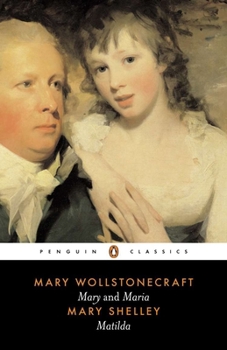Mary; Maria; Matilda
Select Format
Select Condition 
Book Overview
These three works of fiction - two by Mary Wollstonecraft, the radical author of A Vindication of the Rights of Woman, and one by her daughter Mary Shelley, creator of Frankenstein - are powerfully emotive stories that combine passion with forceful feminist argument. In Mary Wollstonecraft's Mary, the heroine flees her young husband in order to nurse her dearest friend, Ann, and finds genuine love, while Maria tells of a desperate young woman who seeks consolation in the arms of another man after the loss of her child. And Mary Shelley's Matilda - suppressed for over a century - tells the story of a woman alienated from society by the incestuous passion of her father. Humane, compassionate and highly controversial, these stories demonstrate the strongly original genius of their authors. For more than seventy years, Penguin has been the leading publisher of classic literature in the English-speaking world. With more than 1,700 titles, Penguin Classics represents a global bookshelf of the best works throughout history and across genres and disciplines. Readers trust the series to provide authoritative texts enhanced by introductions and notes by distinguished scholars and contemporary authors, as well as up-to-date translations by award-winning translators.
Format:Paperback
Language:English
ISBN:0140433716
ISBN13:9780140433715
Release Date:May 1993
Publisher:Penguin Classics
Length:256 Pages
Weight:0.46 lbs.
Dimensions:0.6" x 5.1" x 7.8"
Age Range:18 years and up
Grade Range:Postsecondary and higher
Customer Reviews
2 ratings
A fierce feminist and a mortal passion
Published by Thriftbooks.com User , 19 years ago
The two stories of Mary Wollstonecraft 'Mary' and 'Maria' (the latter unfortunately unfinished) tackle the same problem: the position of women in society. 'But a wife being as much a man's property as his horse, or his ass, she has nothing she can call her own.' The reactions of their protagonists are diametrically opposed. Mary's attitude to life is resignation: 'I cannot argue against instincts.' She longs for death, to enter a 'world where there is no giving in marriage.' Maria, on the contrary, tries to take her destiny in her own hands and hits back: 'I feel that the evils women are subject to endure, degrade them so far below their oppressors as almost to justify their tyranny.' Both stories show the author's general social preoccupations. Mary is confronted with hunger, want of education, poverty and misery, but her reaction is melancholic: 'I have been wounded by ingratitude'. Maria attacks 'the enslaved state of the labouring majority' and 'the evils which arise in society from the despotism of rank and riches.' She appeals for more social justice. 'Maria' is a much stronger work than 'Mary'. It has a better plot and its message is still actual. 'Matilda' was considered too shocking to be published for over a century, because it treats a taboo passion: incest. It is a powerful portrait of a fatal attraction between a father and his daughter. It is brilliantly written by an intelligent and very well read author: 'more lovely than a sunbeam, slighter, quicker than the waving plumage of a bird, dazzling as lightning and like it giving day to night, yet mild and faint, that smile came.' The stories are excellently introduced by Janet Todd. Highly recommended.
I love you
Published by Thriftbooks.com User , 20 years ago
When Matilda's dad admits to his daughter that he loves her the world falls apart for them both. How can this be so? Mary Shelley creates a scenario - so similar to aspects of her own childhood - that makes sense of this. The love expressed in this ever-so-ambiguous word is, in this case, the inappropriate form of love. What disappoints me about this is that no-one recovers from this situation, and others continue to be damaged/hurt. Once again, as I've seen in so many other works of fiction, the 'damaged' person is given no chance of recovery, of rising above the disaster. Mary Shelley is such an interesting person (far more interesting than the popular interpretations of her novel Frankenstein suggest) but to appreciate her, even in part, I believe you need to consider her parents. Her father was William Godwin, perhaps the real originator of anarchism (although I don't think he used that word). He was a firm believer that people acting alone can achieve more and better than is achieved by having them controlled and imposed on by laws and governments. Mary's mother was Mary Wollstonecraft - a champion of equal rights for women. When Mary became pregnant, Mary and William chose to get married - not for themselves - they didn't believe in the institution of marriage - but for the child. Sadly Mary Wollstonecraft died in childbirth and William was left with a new baby (whom he named Mary after her mother) and a slightly older girl, Fanny. All of William's beliefs that people should live their own lives in their own preferred ways was challenged by Mary - especially in her relationship with the poet Percy Bysse Shelley whom she married (hence the name Mary Shelley). When Mary lost her own baby boy William (named after her father?), she got some of her grief out by writing Matilda. But it appalled William and he refused to allow it to be printed. Even the strongest philosophies will fall apart!! But if you read Matilda and recall the facts of William and Mary's lives, you will see why. This is a valuable book, containing not only Mary's short novel Matilda, but also two works of her mother. Recommended other reading: Frankenstein - Mary Shelley (this is a thoughtful and serious work) Enquiry Concerning Political Justice - William Godwin (this is very long but is also very thoughtful and a great lead in to reading more accessible anarchists such as Peter Kropotkin, as well as less accessible ones like Max Stirner) Caleb Williams - William Godwin






